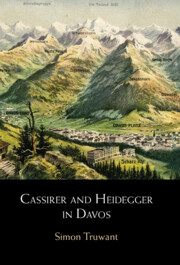Book contents
- Cassirer and Heidegger in Davos
- Cassirer and Heidegger in Davos
- Copyright page
- Contents
- Acknowledgements
- Introduction
- 1 Reconstructing the Davos Debate
- Part I The Lasting Meaning of Kant’s Thought
- Part II ‘What Is the Human Being?’
- Part III The Task of Philosophy
- 8 Cassirer’s Functional Conception of Philosophy
- 9 Heidegger’s Hermeneutic Conception of Philosophy
- 10 Enlightenment or Therapy
- Conclusion
- Bibliography
- Index
Conclusion
The Terminus a Quo and Terminus ad Quem of the Davos Debate
from Part III - The Task of Philosophy
Published online by Cambridge University Press: 05 May 2022
- Cassirer and Heidegger in Davos
- Cassirer and Heidegger in Davos
- Copyright page
- Contents
- Acknowledgements
- Introduction
- 1 Reconstructing the Davos Debate
- Part I The Lasting Meaning of Kant’s Thought
- Part II ‘What Is the Human Being?’
- Part III The Task of Philosophy
- 8 Cassirer’s Functional Conception of Philosophy
- 9 Heidegger’s Hermeneutic Conception of Philosophy
- 10 Enlightenment or Therapy
- Conclusion
- Bibliography
- Index
Summary
Reconsiders the stakes of the Davos debate on the basis of my previous findings. I first summarize the established similarities and differences between Cassirer and Heidegger's philosophical projects. Next, I reinterpret their issues of contention in light of the starting point and aim (the terminus a quo and terminus ad quem, as they put it in Davos) of their philosophies, which, I argue, Cassirer and Heidegger failed to accurately compare. In this way, I show that Cassirer's and Heidegger’s thought, despite being grounded in irreconcilable ontological and methodological assumptions, can nevertheless positively incite each other. After all, they share a philosophical concern: to comprehend and aid the human being’s capacity to orient itself in and towards the world. This means that the Davos debate was an elaborate disagreement about a shared interest of profound significance for human life after all, or in other words a true philosophical debate.
Keywords
- Type
- Chapter
- Information
- Cassirer and Heidegger in DavosThe Philosophical Arguments, pp. 245 - 248Publisher: Cambridge University PressPrint publication year: 2022



